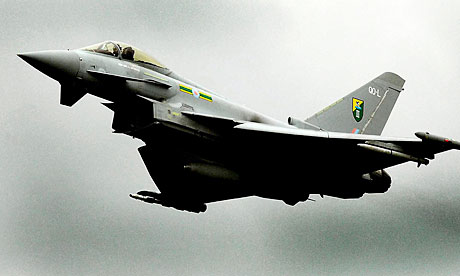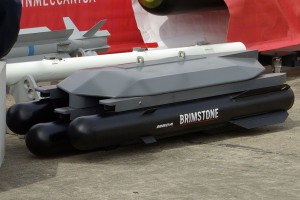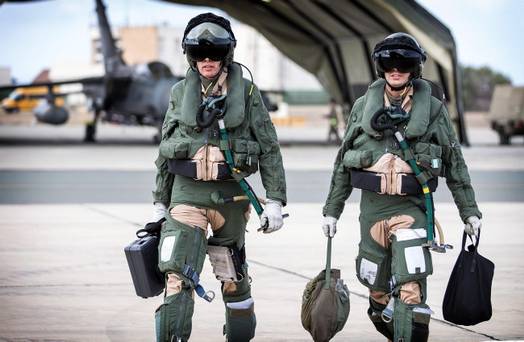The RAF’s first few missions against ISIS ended without combat. Tornado fighter-bombers flew all the way from Cyprus to Iraq, found no targets, and turned back. This is not a particularly British problem – after over six weeks of bombing, even the USA is struggling to find targets to bomb in Iraq. However, after all the debate and build-up, the knowledge that the United Kingdom was aimlessly trawling the Iraqi desert for something to do seemed yet another marker of post-imperial decline. In this article, I will outline the means Britain has deployed as part of the anti-IS coalition, and how these means have been affected by austerity measures since 2010.
The UK has had air assets in striking range of IS since the humanitarian crisis on Mount Sinjar erupted in early August 2014. Six Tornado GR4s were based in Cyprus, and were further supplemented by two more on October 2, 2014. These planes are part of RAF 2 Squadron, and were due to be replaced next year by the Eurofighter Typhoon. However, the Typhoon is not yet able to carry Brimstone missiles, which have proven ideal in eliminating the small, lightly-armoured targets of low-intensity combat that has characterized British military operations over the last decade. Thus, when NATO went to war in Libya, the Tornado GR4 was given a reprieve. Again, as the UK went to war in Iraq during 2003 and in 2014, it seems the Tornado lives to see another low-intensity air war.

The continuing failure to integrate the Brimstone missile with the Typhoon is troubling, and does not reflect well on British defence planning. Therefore the British defence contractor BAE Systems has been awarded a contract by the UK government to begin the process of adapting the Brimstone for the Typhoon, with the hope of having it integrated by 2018. Since the Tornado was due to be scrapped well before that date, this would have left the Royal Air Force with a severely limited ground attack capacity if these plans have gone ahead. Furthermore, it would have left the entire coalition without the effective capabilities of the Brimstone missile, as the UK is the only state to use the Brimstone for the moment (though the USA, France, and Saudi Arabia have all expressed interest). This was not mentioned in the 2010 Strategic Defence and Security Review, suggesting a lack of foresight.
While the United States Navy was able to launch F-18 flights from the super-carrier USS George H. W. Bush,, currently based in the Persian Gulf greatly increasing the tempo and quantity of sorties, the Royal Navy’s last aircraft carrier, the HMS Ark Royal was towed to a Turkish scrapyard in June 2013. Its replacement, the HMS Queen Elizabeth is not due to be combat-ready for years to come. It won’t even have any jets to fly until the F-35 is available in 2020. Again, defence cuts have deprived the UK of vital capabilities for long stretches of time.
How much does this matter for the war on the Islamic State?
Not an enormous amount, as it turns out.
The United Kingdom is part of a broad international coalition led by the world’s pre-eminent military power. As stated in the previous article, the most valuable thing it is bringing to the table is a symbolic show of support for the campaign – six RAF jets are not what is going to break IS’s back, even ones armed with the Brimstone. Furthermore, even after being cut “to the bone”, the UK was able to field just enough to make a token contribution and of a similar size to a number of allies (Belgium, France, the Netherlands, Canada, and Australia have all sent six jets). This is the sort of mission the 2010 SDSR considered British forces would most likely to be called upon to participate in. In contrast, during the Libyan campaign, Britain took a more leading role with twenty Tornadoes participating.

Even if this weren’t the case, the Islamic State is not enough of a pressing threat to the United Kingdom to necessitate an overwhelming unilateral response. Despite the apocalyptic language leaders have used to justify the war and the Islamic State’s undeniable brutality and potential to spread terrorism to the West, British security would not be intolerably diminished were IS to survive.
Britain has however, been lucky in one important respect. If this campaign had been taking place in much of the rest of the globe, the UK would have had to secure basing and overflight rights, etc., because of its lack of carrier strike capability. In this case, there is a RAF base in Cyprus, less than two hours‘ flight from Erbil, the capital of the Kurdish Region of Iraq. This simplifies matters considerably and avoids the embarrassment of not being able to participate for want of an aircraft carrier.
After four years of budgetary austerity, which isn’t set to end any time soon, and more than a decade of war, British military capabilities have been degraded. Poor planning and confused procurement policies have only exacerbated matters. While in this instance, the war is low-intensity and low-priority enough for it not to matter Britain may not always be so lucky.




